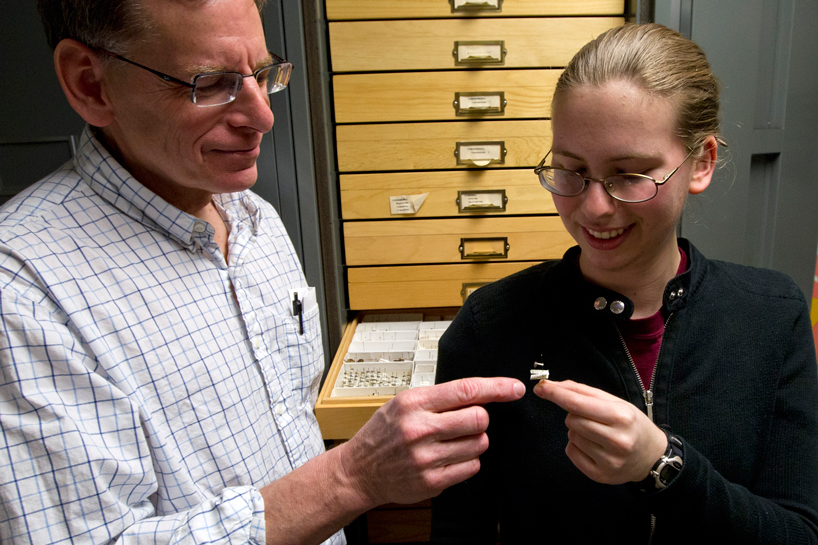
Robert Marquis, professor of biology at UMSL and Christina Baer, a doctoral student in biology at UMSL, conducted a study that found leaf-tying caterpillars are inadvertently benefitting adult Asiatic oak weevils, an invasive species. (Photo by August Jennewein)
Caterpillars native to Missouri are inadvertently helping out an invasive insect, according to a study by scientists at the University of Missouri–St. Louis.
Leaf-tying caterpillars build shelters by binding together overlapping leaves. Now it turns out adult Asiatic oak weevils are making their home inside of those leaf ties. In addition to feeding inside the leaf ties, the structures also shelter the weevils from predators.
“Thus, these native leaf-tying caterpillars engender the success of an invasive species via structural modification of potential host plants, the first described example of this phenomenon,” according to the study by Robert Marquis, professor of biology and director of the Whitney R. Harris World Ecology Center at UMSL, and Christina Baer, a doctoral student in biology at UMSL.
The international scientific journal Ecology will soon publish their paper “Native leaf-tying caterpillars influence host plant use by the invasive Asiatic oak weevil through ecosystem engineering.” Their findings were also highlighted on the website for Science magazine.
The Asiatic oak weevil is so abundant on oaks in Missouri that it causes major damage to mature trees and reduces growth of tree seedlings. Leaf quality was always thought to be the sole determining factor in attracting the weevils. However, in examining six common tree species, researchers started noticing a higher number of weevils on two of the tree species, which happened to have more natural leaf ties.
In laboratory testing, the weevils fed on all six species but again continued to prefer the two tree species. When artificial ties were added to all six tree species weevil density and feeding increased on all six tree species, demonstrating that the presence of the leaf-tying caterpillars and the leaf ties they make influence tree choice.
The study was conducted in the North Woods Conservation Area of Cuivre River State Park, located near Troy, Mo., during the summer of 2009 as part of the National Science Foundation’s Research Experience for Undergraduates program.
Marquis has been studying interactions among insect species on oak trees at this study site since 1995. Baer is now studying similar interactions in the tropical dry forest of Costa Rica, as the focus of for her dissertation research, supported in part by Harris Center funding.















